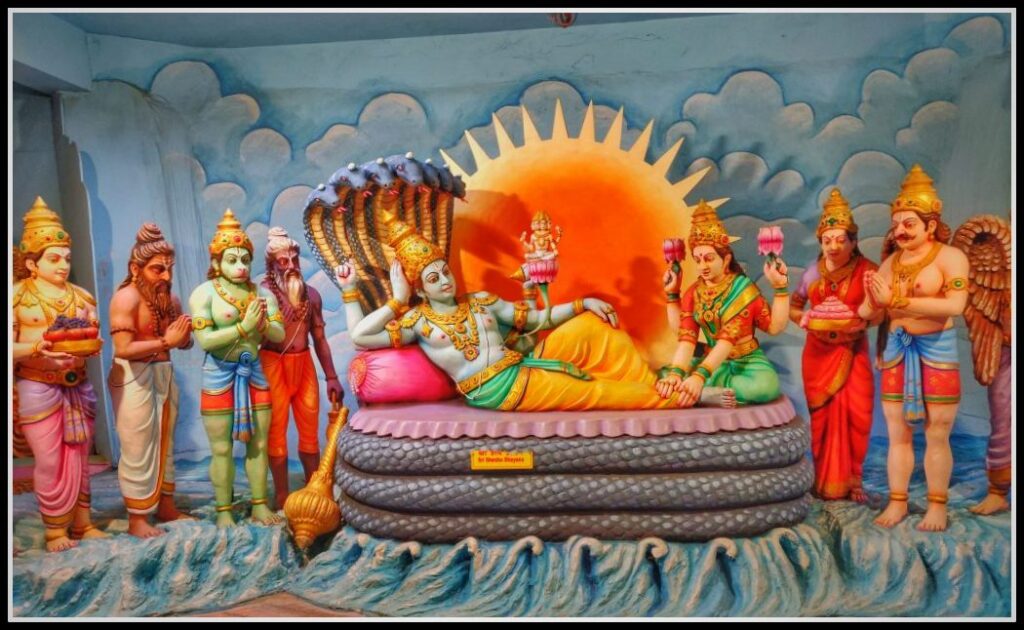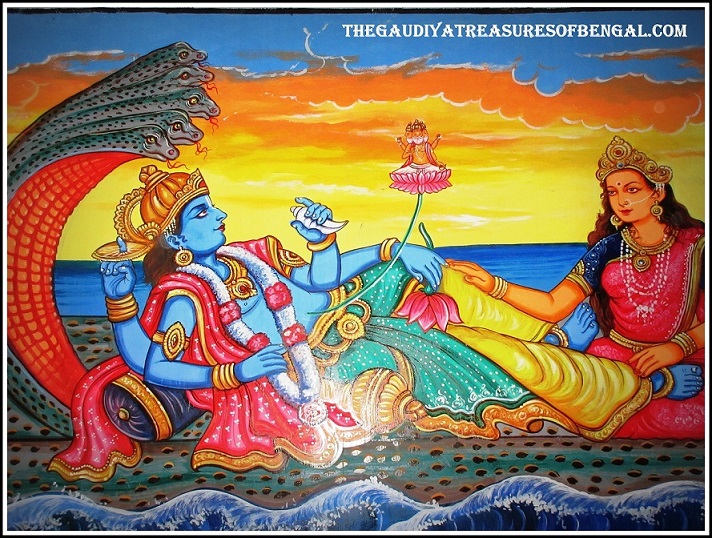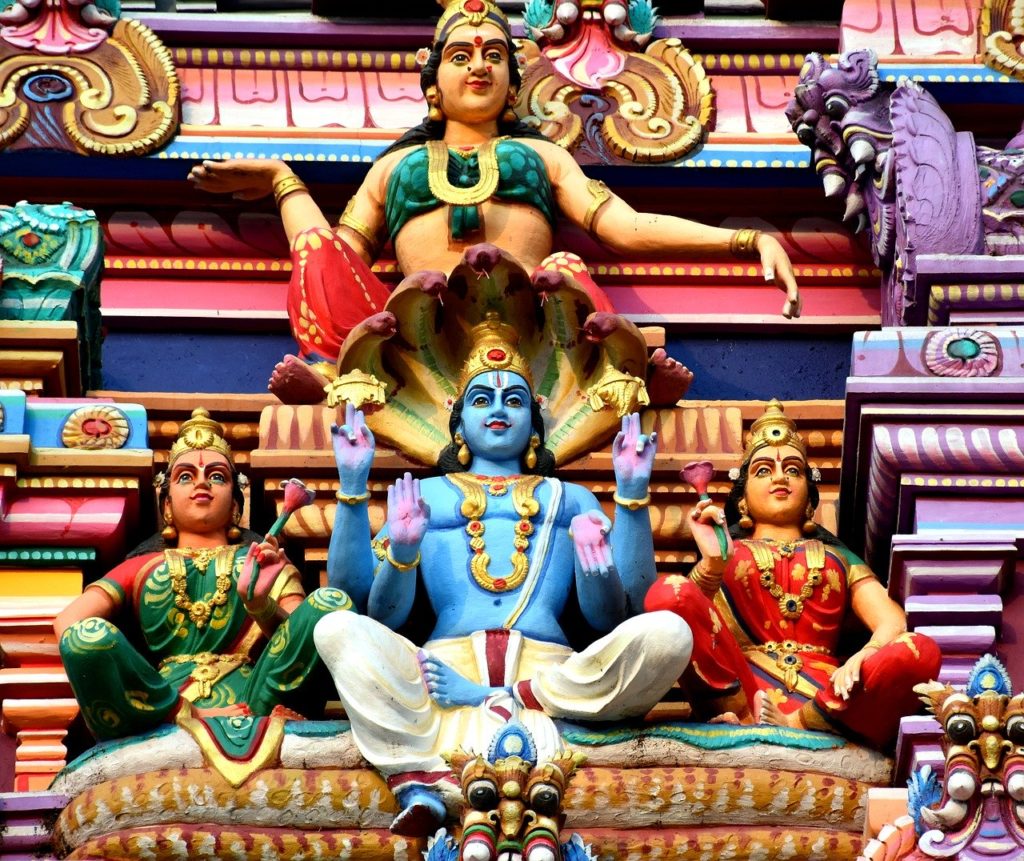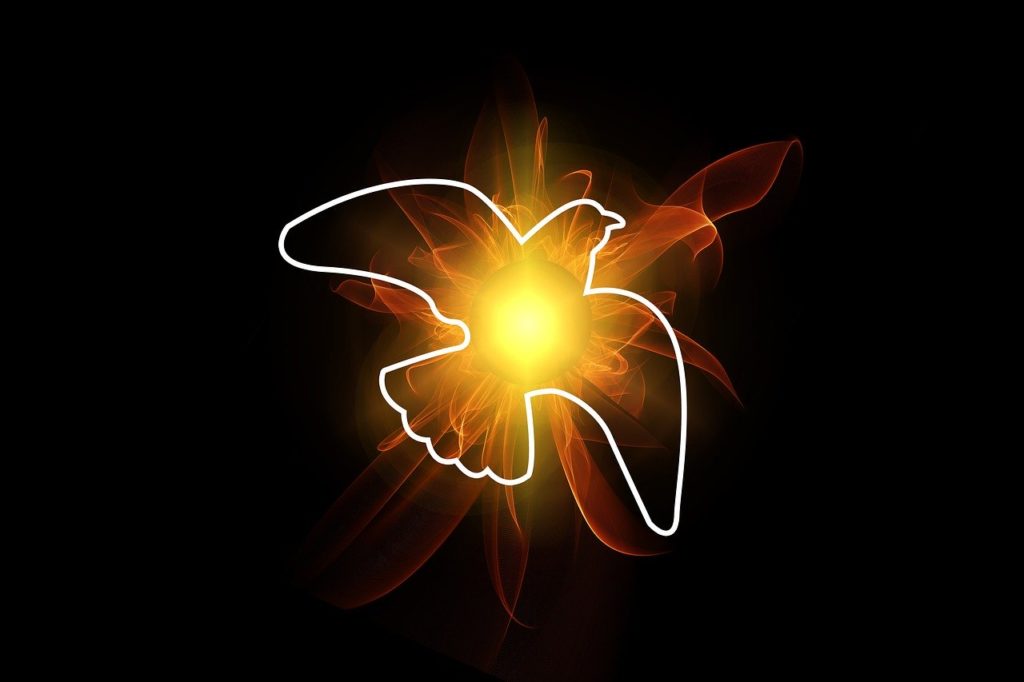
Krishna is also referred to as ‘Bhagavan Swayam’ in Srimad Bhagavatam, thereby implying that He is the source of all avatars (incarnations) of Godhead. Krishna is ‘Svayam rupa’ or the original supreme personality of Godhead, and is also referred to as ‘puskala’ or the most complete. When various forms of the Supreme Lord manifest their appearance in this material world for various purposes, they are known as ‘avatars’. We have previously discussed the various forms of the Supreme Lord (Svayam rupa, tad ekatma rupa, avesha) and they are known as avatars when they descend from the spiritual to the material world. These various forms of the Supreme Lord are eternally existing in their own spiritual abodes. Avatars can appear through parents, as expansions, or without the help of any agency. For example, Lord Krishna and Ramachandra appeared as the sons of Vasudeva and Dasaratha respectively. Garbhodakasayi Vishnu originates as an expansion of Maha-Vishnu. While among those who appear without help are Matsya and Hamsa avatars. There are six types of avatars of the Supreme Lord namely Purusha, Guna, Lila, Manvantara, Yuga, and Shaktyavesha avatars. In this article, however, we are going to discuss the Purusha avatar of the Lord in detail.
Purusha avatar
The Vishnu Purana states the following about the Purusha avatar –
Tasyaiva yo nu guna-bhug bahudhaika eva
Suddho py asuddha iva muti vibhaga bhedaih
Jnanavitah sakala sattva vibhuti karta
Tasmai nato smi puruusaya sadavyayaya
(Vishnu Purana, 6.8.61)
–
I offer my prostrated obeisances unto the infallible Purusha, who appears from the original Supreme Lord. The Purusha is completely transcendental to material nature, although He seems otherwise when He expands Himself into various personal forms that associate with the modes of material nature. The Purusha possesses perfect knowledge and manifests all the living beings in this wonderful creation.

Srila Sridhara Swami comments that ‘tasyaiva anu’ meaning ‘He appears afterwards’ indicates that the Purusha avatara expands from the Supreme Lord (Krishna). In other words, the Purusha avatars are expansions and not the original Supreme Personality of Godhead.
The Purusha avatar associates with material nature (prakriti) by glancing over her at the beginning of creation, and thereafter maintaining conscious control over the creation that evolves from her. Although He is the cause, yet the Purusha remains unaffected and uncontaminated by material nature. The Purusha avatars preside over the modes of material nature and those who appear in order to perform pastimes.
The Satvata tantra (1.30) states the following – Vishnu has three forms called Purusha. The first of them is ‘Maha-Vishnu’ who creates the total material energy (mahat), the second is Garbhodakasayi Vishnu, who is situated within each universe. The third is Ksirodakasayi Vishnu, who lives in the heart of every living being. One who knows these three becomes liberated from the clutches of Maya (illusion).
Maha Vishnu
Maha Vishnu is the Purusha avatar who originates from Narayana, the Lord of Vaikuntha. Maha Vishnu is the source of the vast expanse of spiritual water known as the Causal ocean (Karana sagar). This is why the causal ocean is also known as ‘Sankarsanatmaka’ as it is created from the body of Sankarsana Maha-Vishnu. Maha Vishnu lies on the causal ocean resting upon the bed of Ananta Sesha. As He rests on the causal ocean or ‘Karana sagar’, Maha Vishnu is sometimes also referred to as ‘Karanarnava-sayi Vishnu’.

He glances at material nature (Prakriti), thus impregnating her with the seeds of the material universes and the spiritual sparks who populate those universes. Lord Maha-Vishnu then expands Himself into innumerable Garbodakasayi Vishnus in all of these universes.
Garbhodakasayi Vishnu
Garbhodakasayi Vishnu lies within the water of each universe and from His navel sprouts a lotus stem on whose atop sits Brahma, the chief engineer of the universe. The stem of this lotus is the resting place of the multitude of planets. When Garbhodakasayi Vishnu first enters a universe, he finds it dark and empty, with no place to reside. He first creates the universal water from the perspiration of His body, which fills half of the universe. He makes His own residence in these waters and thereafter manifests the planetary systems, in the other half of the universe. Within these universal waters, He manifests Vaikuntha, His own abode, and rests on it upon the bed of Ananta Sesha.
Ksirodakasayi Vishnu
Ksirodakasayi Vishnu, the Lord of the ocean of milk, manifests within the heart of every living being in a suitable size. In the case of human beings, His size is that of one pradesa (distance between the tips of a person’s extended thumb and index finger). Ksirodakasayi Visnu is commonly referred to as the Supersoul. Within the ocean of milk, there exists the island of Svetadvipa which is the abode of Ksirodakasayi Vishnu. Unable to find Him, the demigods, go to the shore of the milk ocean and offer prayers unto Him. Ksirodakasayi Vishnu descends to preserve the material world and vanquish principles of irreligion, millennium after millennium. Ksirodakasayi Vishnu is counted both among Purusha and Guna avatars of the Supreme Lord.

Srimad Bhagavatam states the following about Ksirodakasayi Vishnu –
svetadvipa patau cittam suddhe dharma maye mayi
dharayan chvetatam yati sad urmi rahito narah
(Srimad Bhagavatam, 11.15.18)
–
My dear Uddhava, My transcendental form of Vishnu in the island of Svetadvipa is identical with Me in divinity. Anyone who worships this form of Mine (Ksirodakasayi Vishnu) within his heart can surpass the six pangs of material miseries namely hunger, thirst, decay, death, grief, and illusion.